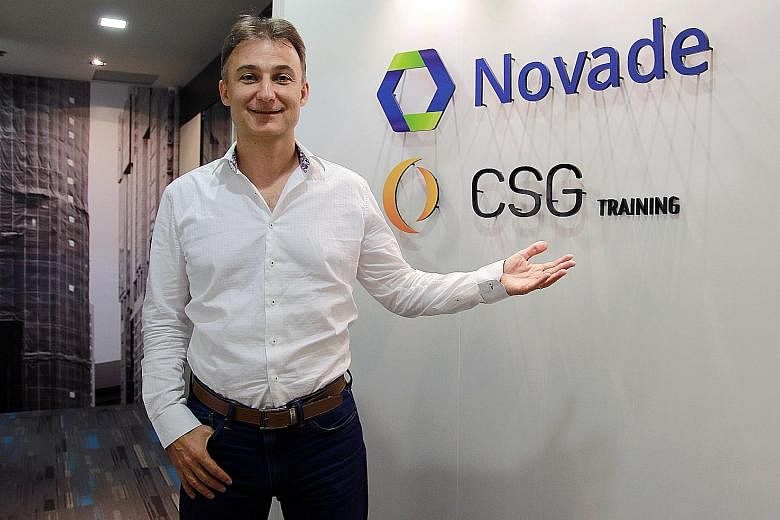Q How did the company get started?
Mr Branthonne I have lived in Singapore for 16 years, and spent 11 of those years working at American multinational software company Autodesk. While I was there, I realised there was almost no IT being used in the construction sector, which was surprising given the scale of the projects.
They were run largely using pen and paper, messaging services, spreadsheets.
After learning about this I decided to quit and start a company to address this market.
Many people thought I was crazy - 90 per cent of start-ups die within two years, and I was leaving a comfortable, well-paying job. I co-founded Novade with Singaporean entrepreneur Eugene Low.
I spent the first three to six months talking to a lot of people, visiting hundreds of construction sites.
After spending time with people on sites, I realised they needed help with automating very simple things - for instance, every time they do a site inspection, there are forms to fill up. Can this be done on the phone?
We then started developing the platform, which took us about a year. The company has existed for almost three years now.
Q How do Novade's solutions help construction companies?
A We have four main offerings, which help companies with quality, safety, logistics and maintenance.
For instance, property group MCL Land is using Novade to manage the handover of condominium units to homeowners.
The traditional process involves the developer giving homeowners an inspection form to check for defects. When homeowners submit their inspection forms to the developer, the information goes into a massive spreadsheet and parts of it are sent out to subcontractors, who then rectify the issue.
The subcontractors then go back to the main contractor on these rectifications.
Some defects get dealt with, some might slip through; there is a lot of back and forth.
With our application, which is available on all mobile platforms, homeowners can pinpoint defects in the unit by selecting locations, defect types, even uploading photos. It's all automated, and contractors can get the information in real time.
The application is used similarly on construction sites.
There were some challenges initially with managing these large amounts of data, which needs to be accessible across many different platforms - Web, mobile phones - simultaneously.
When people are on site they also might not have an Internet connection, so the data needs to be accessible offline as well.
The application itself is the tip of the iceberg - the system behind it is very complex.
Q How has Novade grown?
A We reached $1 million in sales within the second year of operations. One million inspections have been conducted with Novade mobile apps in Singapore in the last 12 months.
We're working with seven of the top 10 listed real estate developers here.
We happened to be at the right place at the right time - the technology has become affordable, mobile phones are relatively cheap and work well.
Also, the Singapore market is very demanding - developers are brand-conscious and consumers have very high standards. So companies are keen to have systems to improve their processes.
All our software is developed and coded in Singapore, by world-class developers. We have about 20 people in Singapore and 40 worldwide developing, marketing and supporting our platform.
Singapore is a good place to start something like this. I see similar needs across Asia, especially in countries where a lot of construction is going on. There is massive urbanisation and populations are growing.
Q What are some of the key challenges when it comes to raising Singapore's construction productivity?
A On average, in the last 20 years, productivity in manufacturing has doubled, while construction is still lagging behind.
The difference is that a manufacturing plant is a confined environment where it's easy to adopt new technology, while construction is a fragmented industry. No company owns more than 10 per cent of the market worldwide.
In manufacturing, when a big company says it's going to use a new system to optimise the supply chain, everyone in the supply chain goes along and it's standardised.
In construction it's fragmented and no one can dictate what's going on.
The second issue is that it's a project-based industry.
These two fundamental issues make it tough to implement new methods.
But because the cost of technology is decreasing dramatically, companies can purchase technology like ours that will provide a return on investment within one project.
Q What are your plans for the future?
A We plan to raise funds in 2017 to accelerate our international expansion.
About 11/2 years ago, when I saw the interest and success in Singapore, I decided to see if the business could grow overseas.
Singapore is a small market and, as a tech start-up, you can't survive if you don't expand fast.
For all our products, we have a set of base features that are the same across the board. We then configure them to suit each company or each country.
This mix of standard and highly configurable features has helped us to develop an offering which is flexible and scaleable.
We operate across Asia and Europe, with customers in France, Britain, Hong Kong, Thailand, Malaysia and India. We're also in the process of developing the business in a number of other countries, and expect to be in more than 10 countries in the next six months.
We also plan to make our solution more accessible to SMEs.
It's a big change for companies to move from paper to digital - this is true for both big companies and SMEs.
SMEs are interested in the tech, but they have less resources to put towards deploying it. We're working on this and are trying to figure out how we can package things for them so they can implement it quickly.


